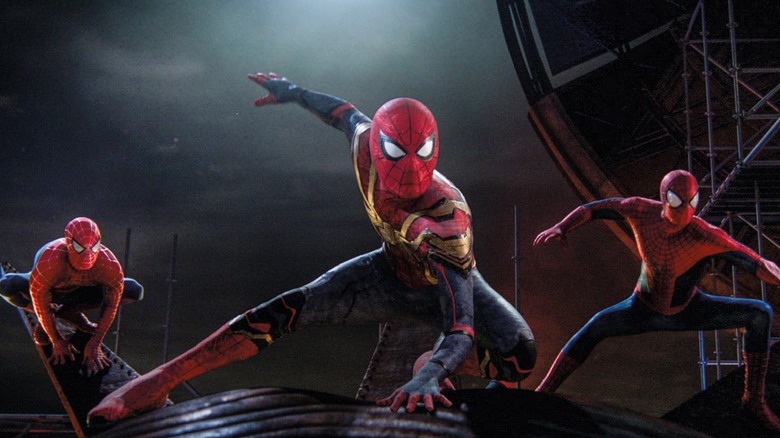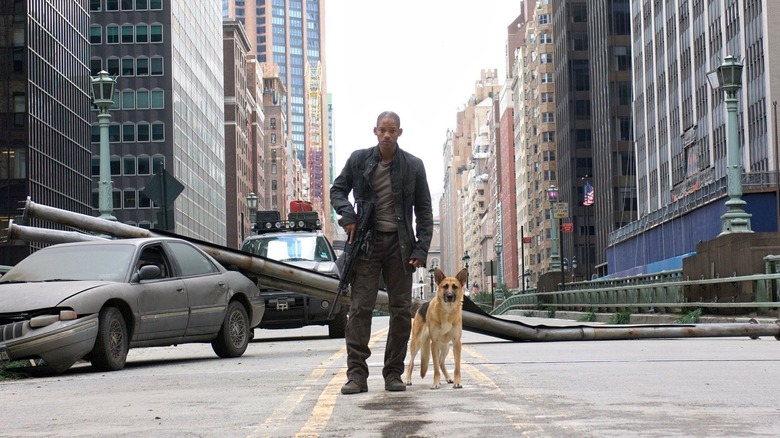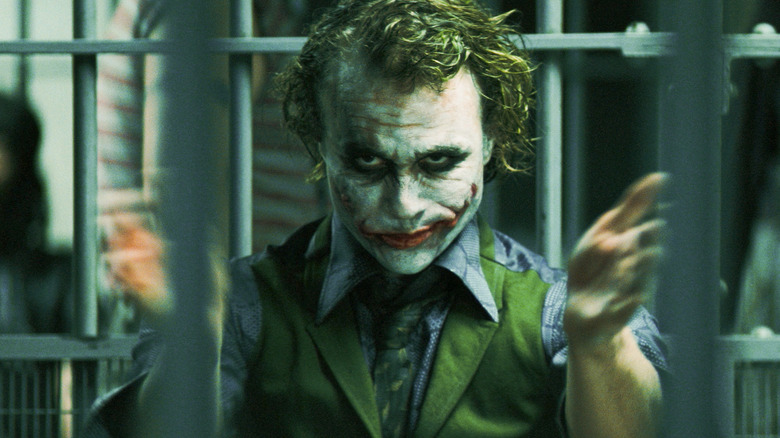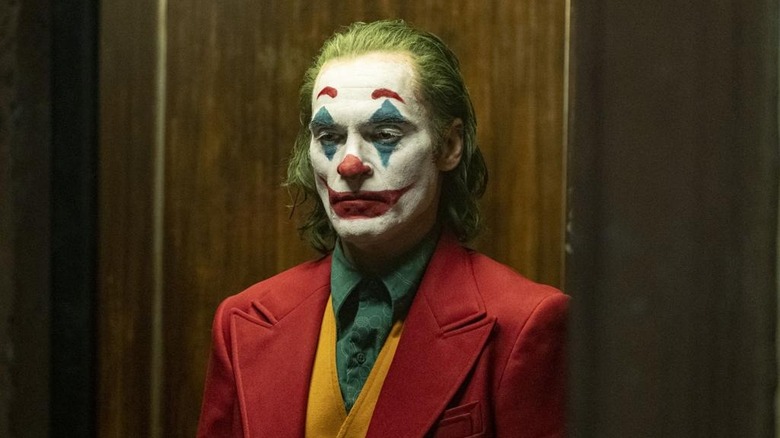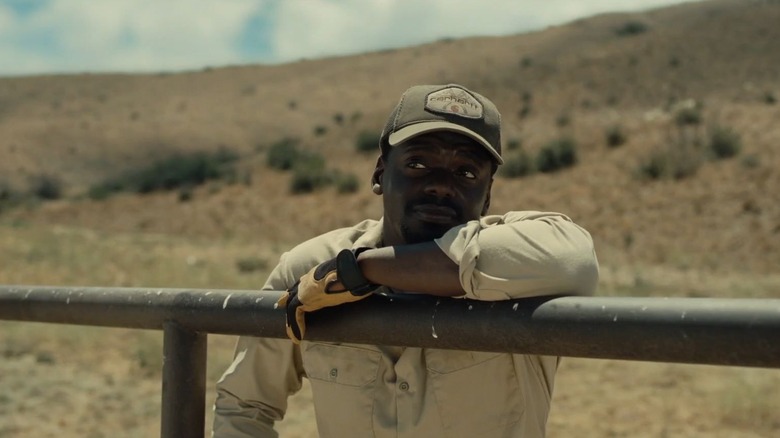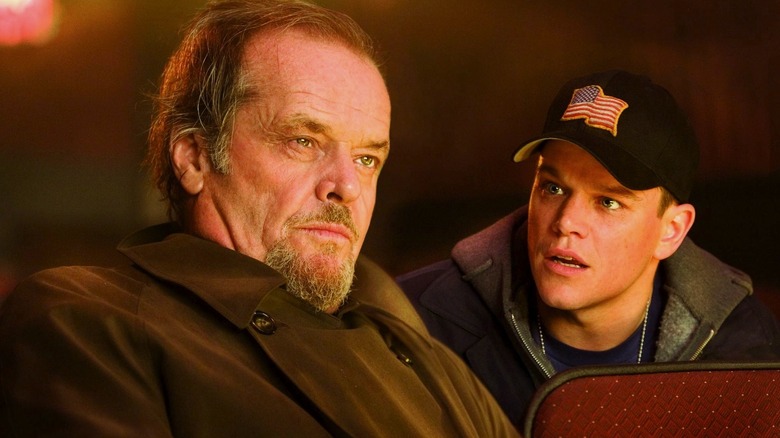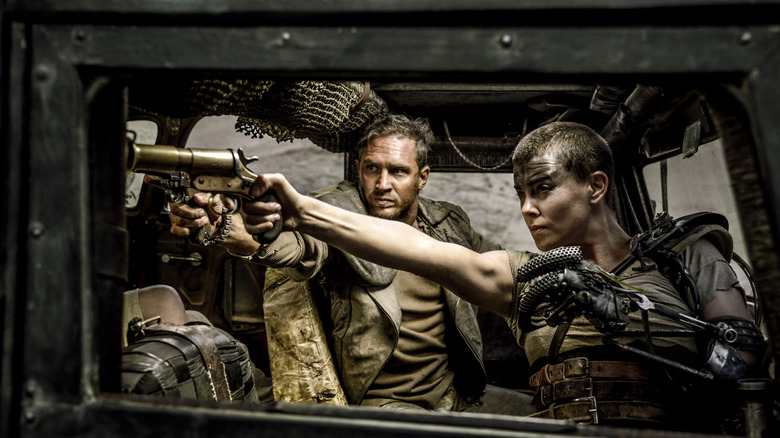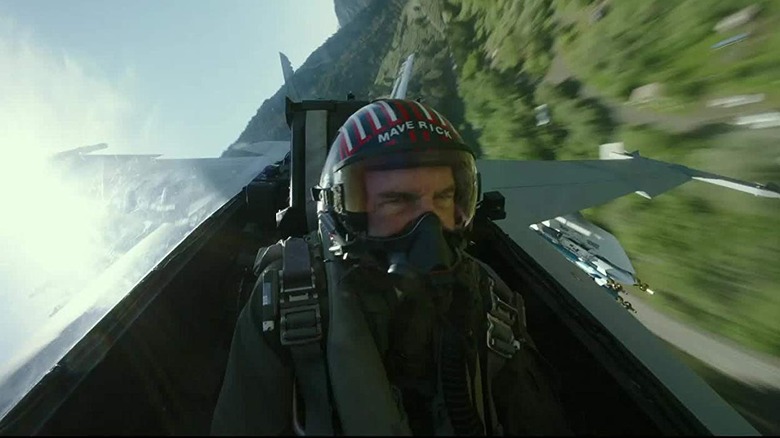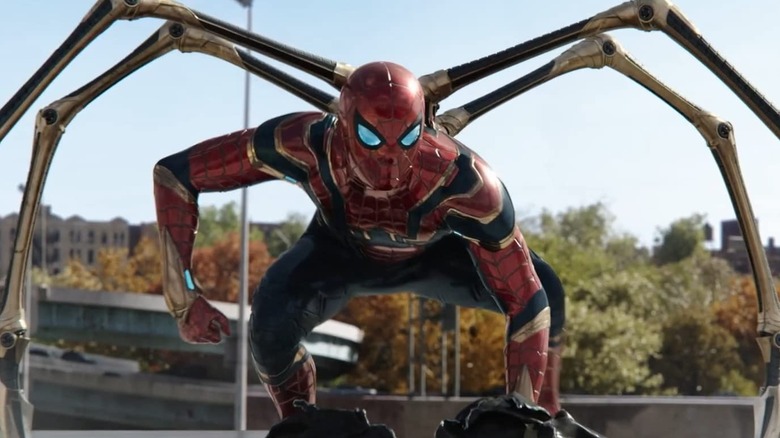Why These Blockbuster Movies Were Never Released In China
In early 2012, a historic breakthrough occurred. China, after years of allowing only a handful of American films into the country's cinemas annually, began allowing a significantly increased number of American features to play on its screens. It was a development reflecting the massive grosses American blockbusters like "Transformers: Dark of the Moon" were accumulating in that country, with both China and American movie studios standing to benefit from this arrangement. In the years that followed, Hollywood bent over backward to appeal to this lucrative marketplace, with the studios forced to change a number of movies for China. This was especially true of costly blockbusters, which tended to play best there.
But even with these historical trends, not every blockbuster American movie has secured a Chinese theatrical run. On the contrary, hits of all shapes and sizes, including some of the biggest motion pictures of all time, have never played in Chinese movie theaters. The reasons why the country barred these titles vary wildly: Some covered material considered politically taboo in China, while others were anchored by actors that had previously criticized the nation or its government. Still others simply never got to play there because of their dark tones. Whatever the reason, these box office smashes never reached Chinese movie theaters, despite both their success everywhere else in the world and the country's often cozy relationship with Hollywood.
Christopher Robin
Several movies that never got theatrically released in China are brutally downbeat affairs. Others are outright R-rated motion pictures grappling with weighty themes that intentionally make moviegoers squirm in their seats. "Christopher Robin," meanwhile, was a 2018 PG-rated Disney family movie starring beloved Hundred Acre Wood residents like Winnie the Pooh. The film had a slightly more subdued color palette and some darker sequences (like a flashback to Christopher Robin getting fired upon in the trenches of World War II), but it's very much a family-friendly Disney movie. Its tone is no different than other live-action Disney movies that played in China like "Maleficent" or "Cinderella." Why on Earth would Chinese censors forbid "Christopher Robin" from playing in the country's theaters?
The same day "Christopher Robin" began its domestic theatrical run, the news broke that it would never play in Chinese theaters. An inside source reported that the issue was Winnie the Pooh himself. The Chinese government had begun suppressing images of Pooh after people had mockingly compared the physical appearance of Chinese leader Xi Jinping to the silly ol' bear. This reportedly led to the film's demise in China, though another source suggested "Christopher Robin" was simply a victim of the limited number of American films allowed into Chinese movie theaters. Whatever the reason, "Christopher Robin" takes the cake as one of the most inoffensive features to never grace Chinese movie theater screens.
I Am Legend
Before the 2010s (when "Avatar" and "Transformers: Dark of the Moon" began redefining what box office success could look like for American movies in China), Hollywood's relationship to the Middle Kingdom was significantly different. American movie studios tried their best to get titles into the country, but everyone was aware that this process was a crapshoot. China allowed an extremely limited number of American movies onto its screens every year. A film's success couldn't be contingent on just this territory, unlike future tentpoles like "Warcraft" that were saved by China at the box office.
The erratic relationship between China and Hollywood in the 2000s crystallized in December 2007, when the country reportedly placed a three-month-long ban on all American films playing in the country. This meant that December 2007 release "I Am Legend" never got to play in China. Will Smith later revealed that he actively tried to secure "I Am Legend" a Chinese theatrical run, which included the "Hitch" leading man talking to the leader of the China Film Group himself.
In the end, not even one of the most iconic movie stars on the planet had the power to change the minds of Chinese censors. Though "I Am Legend" distributor Warner Bros. would have loved to get every dollar possible for the film's box office run, this post-apocalyptic action movie didn't need China to be a hit. "I Am Legend" scored the biggest domestic December opening weekend ever before grossing $585 million globally.
The Dark Knight
Given the modern ubiquity of superhero movie box office hits around the world, it's easy to forget what a singular financial powerhouse "The Dark Knight" was back in July 2008. Screenings were sold out across the globe (especially IMAX showings) and it was the pop culture event to see. At the time, it was only the second movie in history (following "Titanic") to crack $500 million domestically. For comparison's sake, 22 motion pictures have exceeded $500 million in North America as of this writing. But not even a towering phenomenon like "The Dark Knight" could infiltrate every corner of the planet, as Christopher Nolan's directorial effort never got to play theatrically in China.
Interestingly, this was a case of an American movie studio eschewing a Chinese theatrical run rather than Chinese censors banning a movie. In December 2008, Warner Bros. announced it would not pursue a Chinese theatrical run for "The Dark Knight" over cultural differences. Given the tense dynamic between Hong Kong and China, a "Dark Knight" action sequence set in the former country may not have played well in the territory. Plus darker American films also tended to be less popular with Chinese moviegoers. In any case, it wasn't like Warner Bros. needed money from Chinese moviegoers to turn "The Dark Knight" into a hit: by early 2009, "The Dark Knight" crossed $1 billion worldwide, a tremendous accomplishment further solidifying it as a box office sensation for the ages.
World War Z
The complicated history behind "World War Z" was full of struggles and problems. That was all before further controversy erupted just three months ahead of its release. In March 2013, it was reported that a line from the film had been cut where a character speculates that the zombie outbreak could have started in China. Paramount Pictures wanted to ensure a costly tentpole like "World War Z" could play in the Asian nation, so having dialogue even suggesting that the country might be responsible for the apocalypse would not help in this initiative. It was a tweak reflecting how, at the dawn of the 2010s, China was quickly becoming an essential marketplace for Hollywood movies. Films were being outright altered to take advantage of a lucrative corner of the world.
Even with this post-production adjustment, Chinese censors rejected "World War Z" for theatrical release a few weeks before its release. Allegedly, the reasons for its rejection stemmed from the film's emphasis on zombies to Brad Pitt's role in the 1997 feature "Seven Years in Tibet," which was heavily critical of China. While a Paramount Pictures executive contended that there was still hope for the thriller to play on Chinese theater screens, this never came to pass. "World War Z" bent over backward to appeal to this market, but not even censoring the screenplay was enough to ensure that the film could add a Chinese haul to the movie's still considerable $540 million worldwide earnings.
Joker
The entire marketing campaign for "Joker" was predicated on this not being a normal comic book movie. There were no massive explosions or lengthy action sequences here. Instead, director Todd Phillips and company focused on a bleak depiction of a man's psychological descent. It was only natural then that "Joker" would eschew 2010s comic book movie norms by not playing in China. American superhero films were one of the most reliably successful subgenres in this country throughout that decade, but despite this track record, it was clear by the end of October 2019 that this grim R-rated feature would not be exhibited in Chinese theaters.
Considering how often R-rated and downbeat American movies failed to get released in the Middle Kingdom, that was no shock. But "Joker" didn't need China to become a historic box office sensation. Despite pre-release jitters over whether or not audiences would show up for this unorthodox feature, its worldwide haul reached $1.064 billion. This made it the first R-rated movie ever to clear $1 billion worldwide. Impressively, it was also the first movie in 11 years (since another Joker-centric title, "The Dark Knight") to clear $1 billion globally without a Chinese theatrical run.
While "Joker" never graced Chinese multiplexes, the film did impact the country's culture in 2019: Hong Kong protestors co-opted the character during demonstrations against Chinese authorities that fall. No matter what local censors say or do, provocative films tend to find a way to strike a chord with people all the same.
Nope
Jordan Peele's "Nope" made a robust $171.2 million in its worldwide run, including $123.2 million domestically. Though it "only" made $47.9 million internationally, that wasn't surprising given that the film drew heavily from the Western genre, which has never been a big draw for overseas moviegoers. But also not factoring into that global box office haul was a Chinese theatrical run. That wasn't surprising, given that neither "Get Out" nor "Us" got released in the territory either.
However, a greater problem preventing "Nope" from getting released in China was the country's strict attitude on horror movies. While period piece action films and comedies are common there, horror features are far less ubiquitous in that marketplace. Many elements targeted by strict censorship laws in the country heavily dominate typical horror films, like ghosts or supernatural entities. This makes it especially difficult for even homegrown Chinese horror movies to thrive at the box office, let alone American horror exports.
It also doesn't help that most R-rated American movies have to be heavily edited to play in China. Many classic horror films like "The Texas Chain Saw Massacre" would be incomprehensible after such a process. This means that even the biggest American horror movies of all time, like "It," never got Chinese theatrical runs. These historical trends make it unremarkable that "Nope" was the latest R-rated American horror movie hit to not light up Chinese movie theaters.
The Departed
Mark Wahlberg and Martin Scorsese fighting on "The Departed" wasn't the only behind-the-scenes drama this Oscar-winning crime epic contended with. The film's global box office run hit a major snag when Chinese censors confirmed that "The Departed" would not play in the country's movie theaters.
The reason was dialogue in the film that referenced China purchasing military hardware. The fact that director Martin Scorsese was able to get that line into "The Departed" circa 2006 speaks to how differently Hollywood treated the Chinese market in the 2000s. Just a few years later, movies like "Red Dawn" and "World War Z" would alter dialogue and even entire plotlines to avoid offending Chinese moviegoers. Back when "The Departed" was getting off the ground, though, Warner Bros. personnel didn't even blink twice at this line of dialogue. There were no calls to remove it to ensure a Chinese theatrical run nor was an edited version offered up to the country.
Of course, it didn't hurt that, back then, China didn't contribute an enormous amount to typical American movies. The highest-grossing American movie in China in 2006 was "The Da Vinci Code," which grossed just $13.2 million. Long before "Transformers: Age of Extinction" made $301 million alone in this territory, studios had fewer problems releasing mid-budget dramas containing dialogue critical of China. Of course, movies like "The Departed" wouldn't last much longer in Hollywood, given the trajectory of the 2010s global box office.
Mad Max: Fury Road
In hindsight, it's remarkable that "Mad Max: Fury Road" made as much money as it did globally. This deeply weird, idiosyncratic, and often dark feature, that heavily eschewed dialogue, beat out the odds and grossed $379.4 million globally. While not a record-shattering haul, that's way above any other "Mad Max" movie and comparable to pre-2016 R-rated action film titles. There's a good chance "Fury Road" would have even cracked that sacred $400 million+ mark worldwide if it secured a Chinese theatrical run.
But in early 2016, it was reported that, despite the best efforts of distributor Warner Bros., Chinese censors rejected "Fury Road." A homegrown knock-off entitled "Mad Shelia" in late 2016 would later try and give Chinese moviegoers a "Fury Road" fix without the help of the original feature. Given China's hesitancy towards R-rated films and darker titles, the exclusion of "Fury Road" wasn't shocking. It didn't help that the original 'Mad Max" movies aren't very well-known in the country. If the most recent "Star Wars" movies kept struggling in China because of cultural unfamiliarity with the original titles, one can only imagine how "Fury Road" would have gone over in this territory.
Interestingly, nine years later, "Furiosa: A Mad Max Saga" would open in Chinese theaters. However, much like how "Furiosa: A Mad Max Saga" bombed at the box office domestically, the prequel was also a box office failure in China. This development signaled that "Fury Road" might not have missed much bypassing this territory.
Top Gun: Maverick
The very first "Top Gun: Maverick" poster inspired lots of ire on the internet due to some missing patches on Maverick's (Tom Cruise) jacket. Specifically, the Japanese and Taiwanese flags were nowhere to be found despite those pins being on the character's original "Top Gun" outfit. Speculation immediately arose that excluding these flags was a way to generate favor with the Chinese government and ensure "Maverick" would play theatrically in the country.
By the time "Top Gun: Maverick" soared into theaters in May 2022, this whole saga took an unexpected turn. Those flags were restored onto Maverick's jacket in the final cut while original Chinese co-financier Tencent Pictures was no longer involved in the film, which never ending up playing in Chinese movie theaters.
While it's not unprecedented for a post-2011 blockbuster to skip a Chinese theatrical release, it was an increasingly rare turn of events. More importantly, "Top Gun: Maverick" took breaking the box office to a whole new level without a cent from Chinese moviegoers, scoring a gargantuan $1.5 billion+ worldwide haul. This made the film a game-changer for Hollywood, upending a decade of thinking that the country was the most vital territory for blockbuster cinema. Refusing to kowtow to Chinese censors even made it a surprise success in Taiwan, where moviegoers cheered on a decidedly pro-America tentpole. Who knew this would happen when that initial controversy over Maverick's jacket pins broke out?
Spider-Man: No Way Home
In the 2010s, Marvel Studios dominated the Chinese box office with various "Avengers" and "Spider-Man" titles. However, come the new decade, titles like "Eternals" and "Shang-Chi" never got theatrical releases in that country. This trend made it no surprise when "Spider-Man: No Way Home" also failed to get a Chinese theatrical release. A few months after the release of "No Way Home," it was reported that the project's failure to play in China was due to producers refusing to edit a finale set at the Statue of Liberty. The American landmark's heavy presence in "No Way Home" made the movie an immediate no-go for Chinese censors, despite prior "Spider-Man" titles making a pretty penny in the country.
Like "Top Gun: Maverick" the following summer, "No Way Home" demonstrated to Hollywood that it was possible to procure gigantic box office hauls without the Chinese market. Worldwide, "No Way Home" grossed a staggering $1.9 billion, including a little over $800 million in North America alone. That makes "No Way Home" the highest-grossing movie of all time globally without earning a cent in China. In January 2023, it was announced that Marvel Studios would begin releasing movies like "Guardians of the Galaxy Vol. 3" in China again. But the financial feats of "No Way Home" made it apparent that this country was no longer a make-or-break territory for the Marvel Cinematic Universe.
